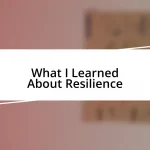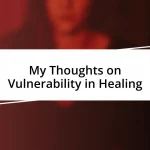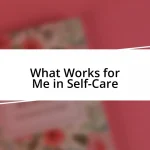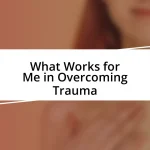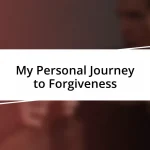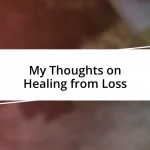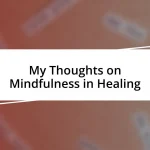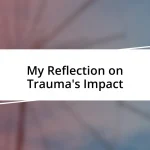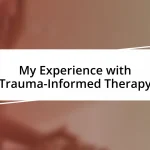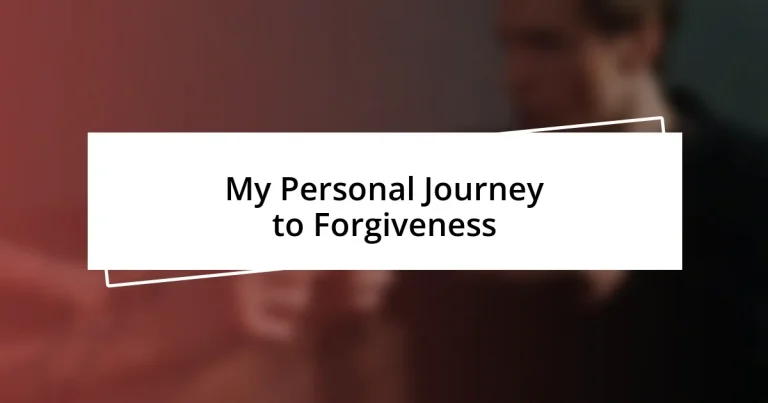Key takeaways:
- Forgiveness is a self-liberating act that promotes personal healing and emotional growth.
- Identifying and articulating personal grievances enhances the understanding of underlying emotions and patterns.
- Self-reflection and sharing experiences with trusted individuals can deepen emotional awareness and facilitate healing.
- Tangible actions, such as writing letters or engaging in support groups, can help symbolize commitment to letting go and strengthen the forgiveness process.
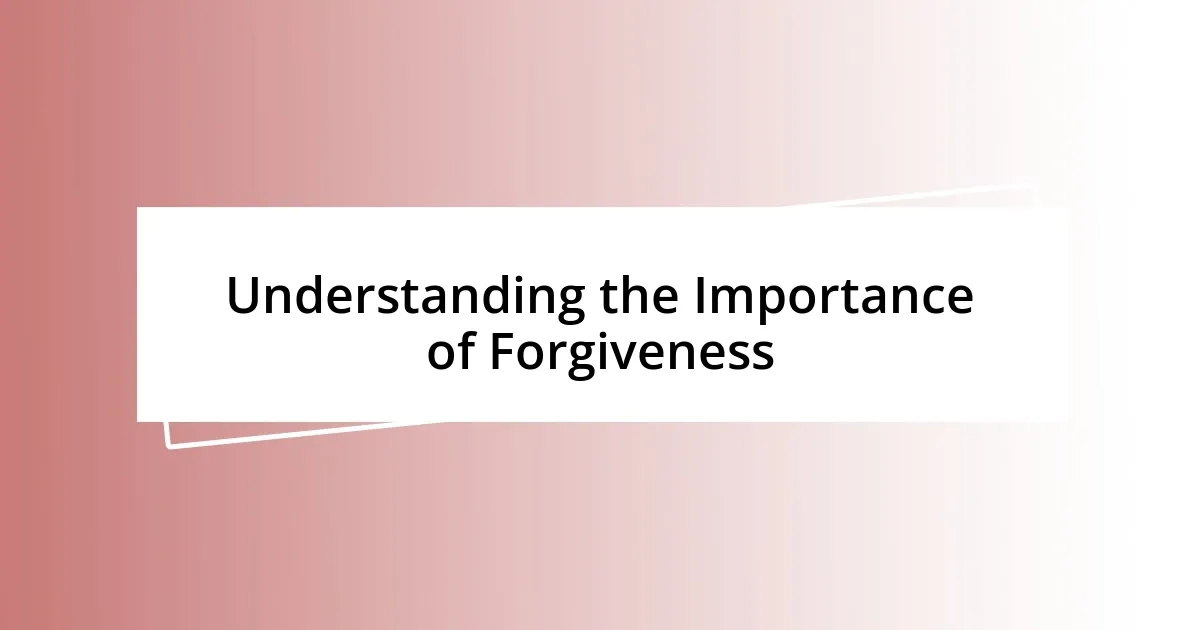
Understanding the Importance of Forgiveness
Forgiveness isn’t just about letting someone off the hook; it’s an act of love for ourselves. I remember a time when I was deeply hurt by a friend’s betrayal. Clinging to resentment felt like carrying a heavy backpack filled with rocks, and I realized that the only person weighed down by it was me. How often do we hold on to anger, thinking it protects us, when in reality, it only cages us in?
I’ve learned that forgiveness can be a powerful catalyst for healing. After years of dwelling on past hurts, I decided to reach out to those who had wronged me, not to reopen wounds, but to find closure. This process wasn’t easy, but the moment I let go of grudges, I felt a lightness that I hadn’t experienced in years. Doesn’t it amaze you how freeing it can be to simply release the burden of anger?
Furthermore, embracing forgiveness fosters personal growth and resilience. I’ve witnessed how forgiving others has opened up space in my life for new friendships and opportunities. When we forgive, we make room for positivity to flow in – a lesson worth contemplating. Isn’t it time we recognized that, at its core, forgiveness is as much about us as it is about others?
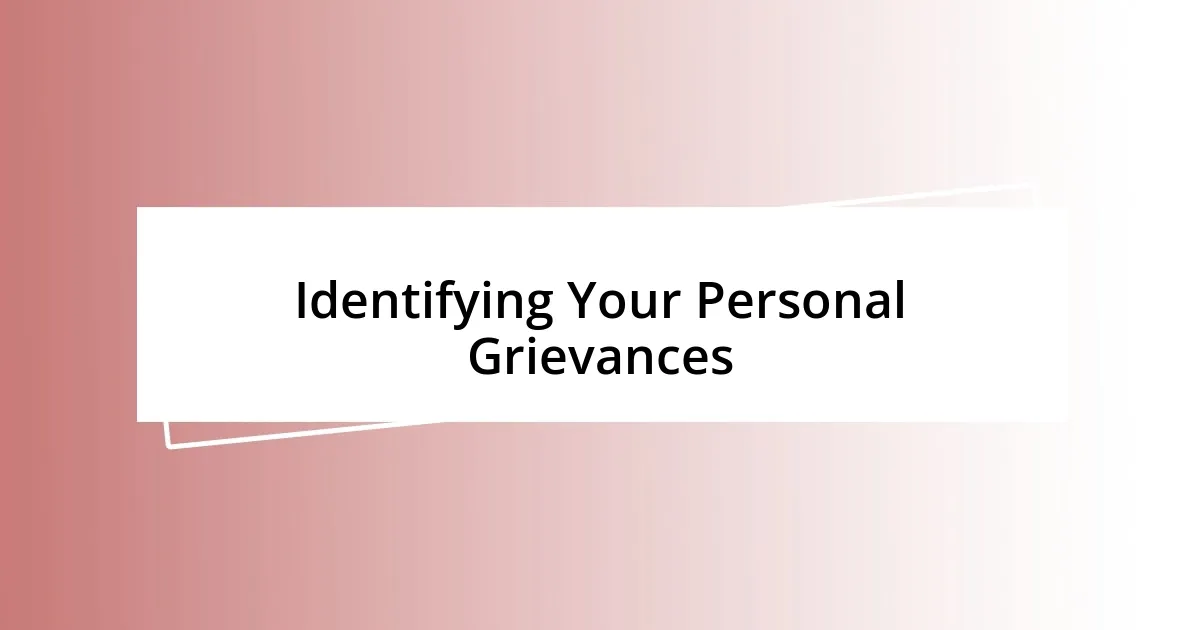
Identifying Your Personal Grievances
Identifying personal grievances is a crucial step in the journey toward forgiveness. I recall a time when I felt betrayed by someone I trusted deeply. Initially, I couldn’t pinpoint my feelings—it was a mix of anger, disappointment, and confusion. Taking a moment to reflect helped me untangle those emotions. It was in writing down my grievances that I began to see the specific instances where my trust was broken, allowing me to confront them head-on.
In my experience, jotting down grievances creates a clearer picture of what truly hurts. I remember sitting with a notebook, pen in hand, and spilling my thoughts on paper. Each grievance unveiled layers of emotion that I had buried. I found it helpful to articulate my feelings, assisting me in acknowledging my pain rather than ignoring it. What were the events that led to these feelings? Identifying them allowed me to move beyond vague sentiments and start my healing process.
Moreover, recognizing the pattern of grievances can reveal deeper issues at play. For instance, after reflecting on my experiences, I recognized how my past relationships affected my current perspective on trust. It dawned on me that each grievance wasn’t just about isolated incidents; they were interconnected, reflecting a broader theme in my life. This realization was enlightening and opened the door to understanding how I could shift my approach to future relationships.
| Type of Grievance | Personal Reflection |
|---|---|
| Trust Broken | I felt an intense betrayal that lingered for months. |
| Feeling Unheard | The frustration of being dismissed led me to suppress my voice. |
| Unmet Expectations | These feelings made me question my self-worth and the intentions of others. |
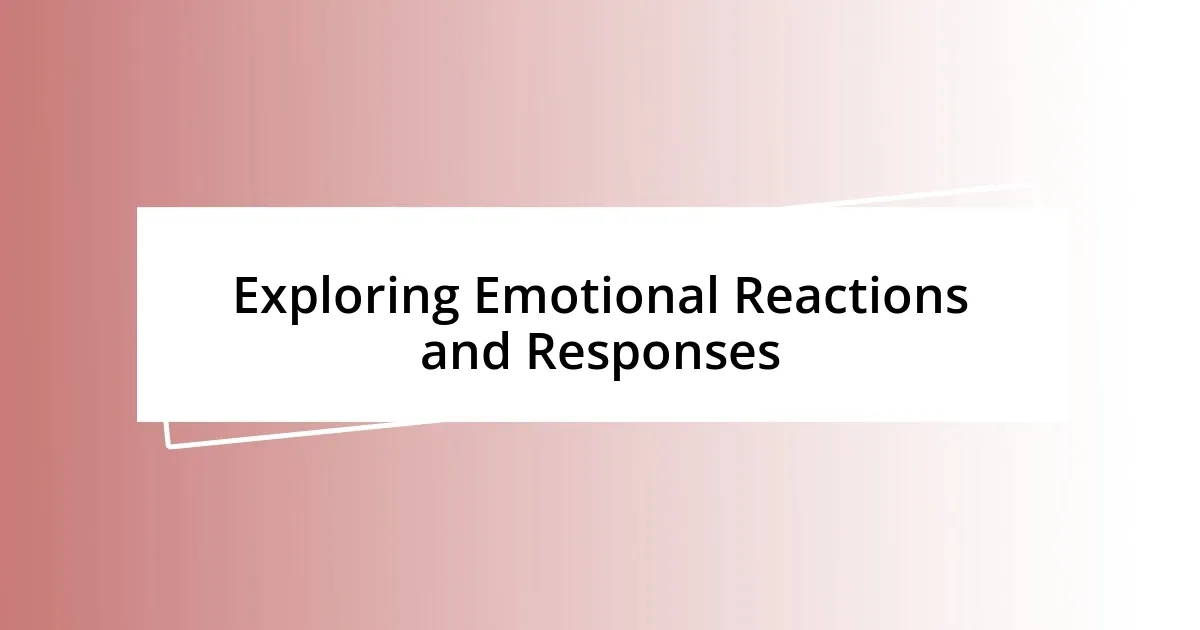
Exploring Emotional Reactions and Responses
Exploring emotional reactions is vital in understanding how we cope with pain. I remember when my emotions felt like a storm raging inside me—everything from sadness to anger seemed overwhelming. Those moments taught me that it’s normal to feel a whirlwind of reactions, and acknowledging them is the first step toward healing. Sometimes, I would just sit with my feelings, allowing myself to feel the depth of the pain without judgment. This practice of emotional acceptance was eye-opening for me.
Here are some emotional reactions that many of us might experience on the journey to forgiveness:
- Anger: Often, I felt a surge of anger that would catch me off guard. It was a natural response to feeling wronged.
- Sadness: There were days when I couldn’t shake the heaviness of sadness, reminding me of what I had lost.
- Confusion: Trying to make sense of my feelings often left me feeling lost, but it pushed me to dig deeper into my emotions.
- Relief: The moment I began to forgive, I experienced unexpected relief, almost like a cool breeze after a sweltering day.
- Peacefulness: Giving myself permission to forgive gradually led to a profound sense of calm within me.
Each of these emotions taught me something valuable about myself and my capacity to heal. I realized that these reactions weren’t signs of weakness; they were part of a necessary process, guiding me toward understanding and ultimately forgiveness.
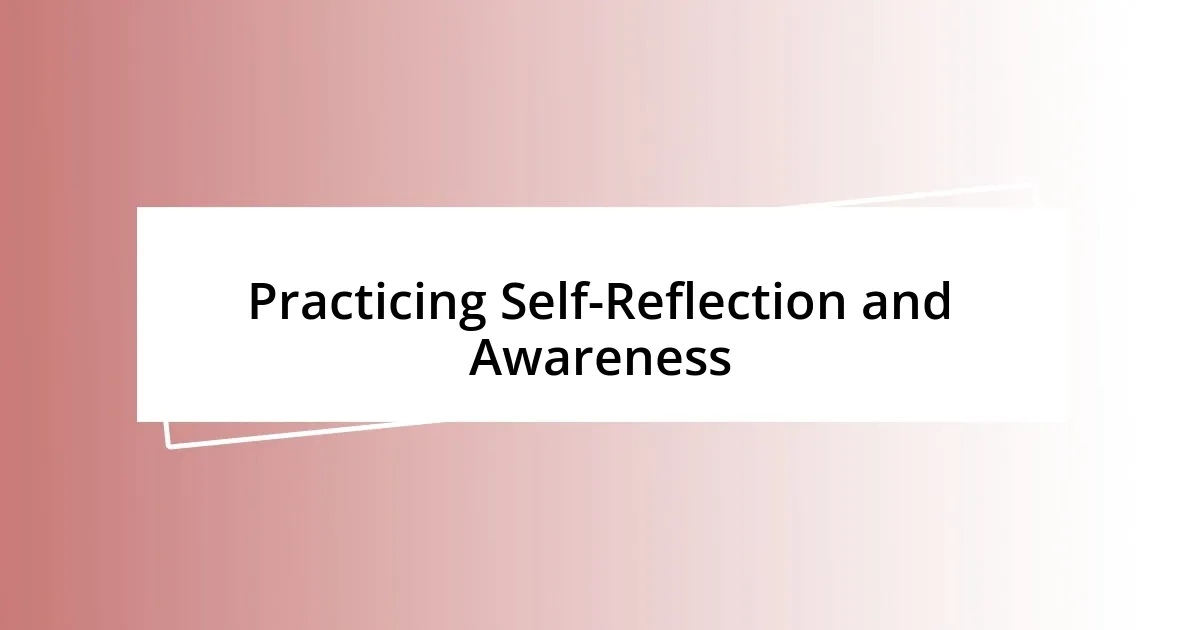
Practicing Self-Reflection and Awareness
Practicing self-reflection and awareness can feel daunting, but it’s essential for personal growth. I remember one quiet Sunday afternoon when I decided to turn off my phone and sit in a cozy corner with just my thoughts. In that stillness, I could hear my inner voice more clearly, guiding me to confront feelings I’d buried for too long. It made me realize that self-reflection isn’t just about identifying what we’re feeling; it’s about recognizing why we feel that way.
In one of my more insightful moments, I came across a quote that resonated deeply: “Awareness is the first step in healing.” It hit me that most of my pain stemmed from unacknowledged emotions. Have you ever paused to think about how certain experiences shape your reactions? When I took the time to unpack a particularly painful betrayal, I discovered it connected back to feelings of inadequacy from childhood. This awareness shifted my perspective and empowered me to take charge of my emotional landscape.
Moreover, cultivating this practice of self-reflection doesn’t have to be a solo endeavor. I often found it helpful to share my reflections with a trusted friend, which opened pathways to deeper understanding. Have you tried discussing your feelings with someone you trust? It was in those candid conversations that I uncovered new layers to my emotions, like peeling back the skin to reveal the tender fruit inside. It became clear that awareness isn’t just about introspection; it’s about connection and learning through shared experiences.
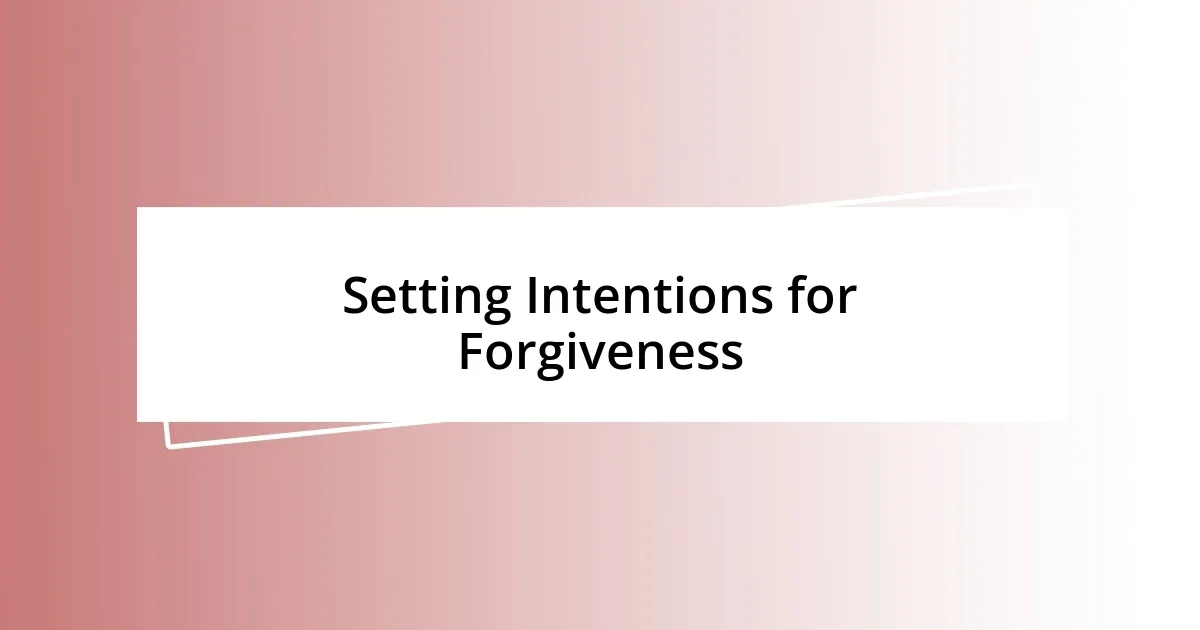
Setting Intentions for Forgiveness
Setting clear intentions for forgiveness is an empowering step in the healing process. I remember the moment I sat down with a journal, determined to articulate what forgiveness meant to me. It wasn’t just about letting go of resentment; it was about reclaiming my peace. By writing down my intentions, I found clarity—what I wanted to heal and what I needed to release.
When I think about setting intentions, I often ask myself: “What would my life look like if I truly let this go?” Each time I reflect on that question, it sparks a wave of hope. I can almost visualize a future free from the burden of past hurts. This mental imagery helps me stay focused and motivated. It reminds me that forgiveness is a choice I make for my well-being.
As I navigated my journey, I learned that intentions can evolve over time. Initially, I might have wished for the other person to understand my pain. Yet, as I moved forward, my goal shifted to cultivating self-compassion. In those moments of vulnerability, I discovered that forgiveness is as much about freeing myself as it is about others. What intentions resonate with you? Finding the right words can transform your mindset and light the way to deeper understanding.
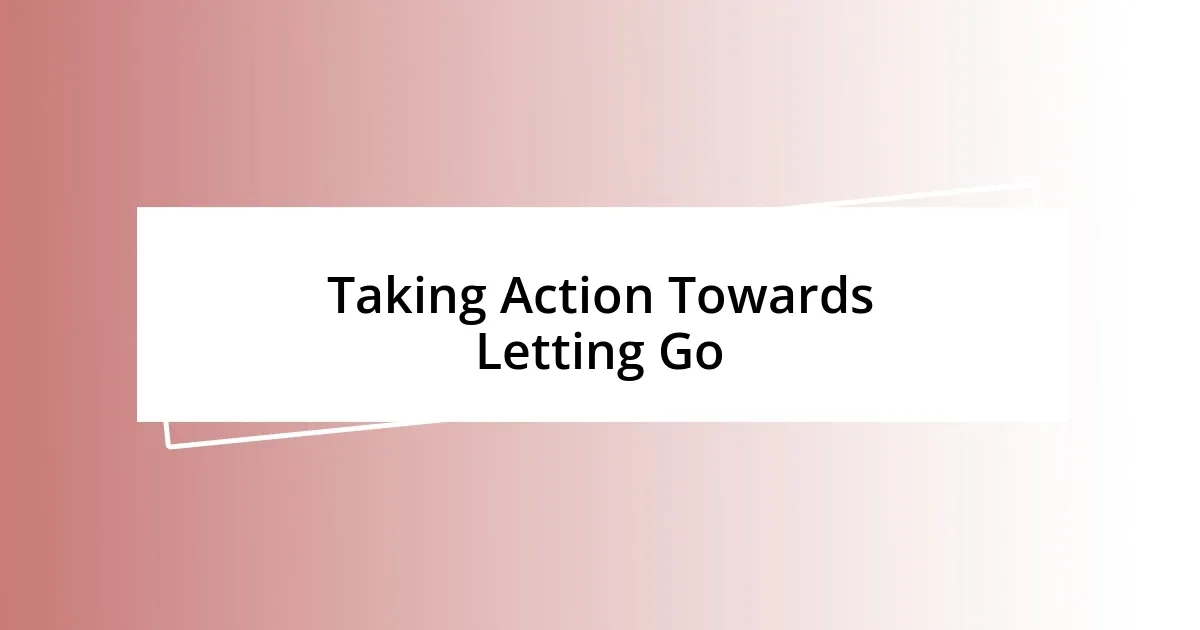
Taking Action Towards Letting Go
Taking action towards letting go often requires me to confront the uncomfortable feelings sitting deep within. I vividly recall a day when I decided to write a letter to someone who had hurt me. This letter was never sent, but pouring out my raw emotions onto the pages allowed me to release a heavy weight I had carried for far too long. It made me realize that sometimes, it’s not about the other person; it’s about the freedom we find in expressing our truth.
One effective strategy I’ve discovered is to engage in small, deliberate actions that symbolize my commitment to let go. A couple of years ago, I found myself clipping all the photos of happy memories that reminded me of the hurt. I then tossed them into a small box labeled “past.” It may sound simple, but to me, it represented a conscious decision to release my grip on those memories that no longer served me. Have you ever tried a physical act to signify emotional change? It became a tangible moment in my journey, reinforcing my intent to move forward.
In my experience, joining a support group can accelerate the process of letting go. I once attended a workshop focused on forgiveness, where I found solace among others who shared similar struggles. Listening to their stories, I realized I wasn’t alone. How would it feel to share your journey with others? This connection helped me process my emotions in ways I never would have imagined, fostering a sense of community that inspired real change within me. Taking action, whether through writing, symbolism, or connection, can spark profound shifts in our ability to let go.
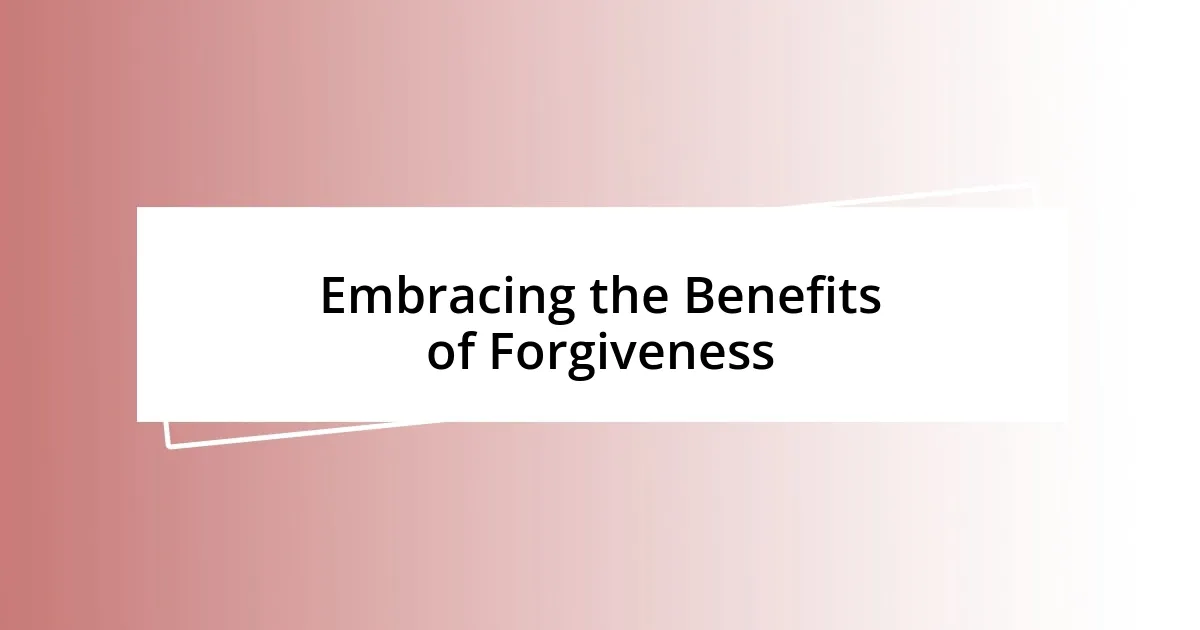
Embracing the Benefits of Forgiveness
Embracing forgiveness brings a profound sense of relief and liberation that can be both surprising and uplifting. I remember the first time I genuinely decided to forgive someone who had deeply hurt me. As I made that choice, I felt an invisible weight lift off my shoulders, as if I had shed a layer of negativity that had been clinging to me. Have you ever experienced that lightness after letting go of a burden? It’s transformative and makes way for joy and peace to seep back into our lives.
One of the most powerful benefits I’ve discovered is the deep emotional freedom that follows forgiveness. It’s like opening the windows of a stuffy room and letting in fresh air. In my case, once I forgave my past, I noticed my anxiety levels significantly decreased. I found myself more present and engaged with the world around me. Can you relate? When we choose to embrace forgiveness, we unlock a door to a brighter, more hopeful future, filled with possibilities and renewed focus on our own happiness.
Additionally, embracing forgiveness has a ripple effect on our relationships with others. I’ve had moments where, after forgiving someone, it not only improved my emotional well-being, but also enhanced my connection with them. I still remember reconnecting with an old friend after resolving some past grievances. That moment of shared laughter and understanding reminded me just how important those bonds are. Isn’t it amazing how offering forgiveness can pave the way for deeper, more authentic relationships?
